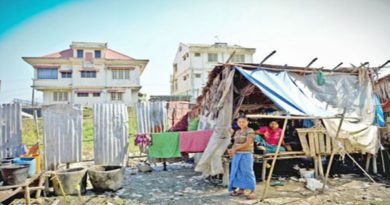COLUMN-OPINION: BANGKOK, Thailand- Thai chairmanship ends on upbeat note

.
– SPACE RESERVE FOR YOUR ADVERTISEMENT –
 <>
<>Thailand’s domestic political situation stood in the way at the outset of the country’s role as Asean chair. In the first half of the year, elections and the resulting government appeared murky and volatile. At first, it was unclear when polls would actually take place, then it became uncertain about what kind of government stability and capability could come out of such a controversial election from a flawed constitution. At the 34th Asean Summit last June, the hosting Thai government was still in transition mode as coalition formation had not been completed. Lingering memories of the last time Thailand chaired Asean in 2008-09, when street protesters disrupted top-level meetings, also compounded a sense of unease about Thailand’s performance as host of major international events when its domestic politics have become extreme and violent.
Though Thai politics remains contentious and cloudy, the Asean chairmanship this year has not been beset with acute internal divisions that stymied a collective position as in the recent past. A major achievement was the grouping’s ability to produce the Asean Outlook on the Indo-Pacific, a somewhat convoluted document that reiterated Asean’s central role as the regional broker to maintain regional peace and prosperity.
.
– SPACE RESERVE FOR YOUR ADVERTISEMENT –
 <>
<>The AOIP implicitly addressed the US-led “Free and Open Indo-Pacific” geostrategy, which in turn is a countervailing outlook on China’s Belt and Road Initiative. The AOIP navigated its own way and maintained Asean’s autonomy amid superpower rivalry and competition between the US and China. The AOIP insisted that existing mechanisms, particularly the East Asia Summit, are adequate to address regional challenges and concerns, highlighting Asean’s Treaty of Amity and Cooperation as principles and guidelines for interstate ties.
Hammering out the AOIP details and getting all 10 member states on board was no mean feat. Other notable agreements centred on environmental protection, namely addressing maritime debris, a common regional cause with no opponents.
.
ADS by Cloud 9:
.
– SPACE RESERVE FOR YOUR ADVERTISEMENT – <>
<>
Beyond the AOIP and cleaning up the marine environment, however, Asean has come up short on its regional trade liberalisation vehicle, known as the Regional Comprehensive Economic Partnership. The Thai government reportedly peddled hard with clear signs of progress and anticipation that some kind of agreement among the 16 member countries, including China and India but not the US, could be announced by the end of its chairmanship. But it appears the RCEP members at most may be able to muster a loose and tentative acknowledgement of progress and success, putting off a more final agreement until next year under Vietnam’s leadership. Yet the RCEP risks unravelling as well because certain members may end up baulking and walking away from trade liberalisation in favour of greater protectionism.
.
– SPACE RESERVE FOR YOUR ADVERTISEMENT –
 <>
<>The Code of Conduct in the South China Sea is another sticking point Asean has been unable to overcome. An Asean-China agreement on the CoC has made progress but a final version and its enforcement provisions and mechanisms appear to be a long way off. Under Vietnam’s chairmanship in 2020, the same year when Vietnam will also assume a non-permanent seat on the United Nations Security Council, the risk will be that Hanoi might over-exercise its leadership prerogatives because it has locked horns with China on overlapping claims in the South China Sea.
While Thailand aimed to manage its Asean chairmanship because of domestic considerations and constraints, Vietnam is setting out to maximise its helmsmanship of Asean. Although Asean needs Vietnam to lead strongly, Vietnam needs to tread with caution in view of its strengthening ties with the US and the US-China faceoff. If China deems Vietnam to be doing any of the bidding of the US on Asean’s back, it will bode ill for Asean, as Beijing will likely push back hard and fast, perhaps aiming to divide Asean outright through pro-China client states.
.
ADS by Cloud 9:
.
– SPACE RESERVE FOR YOUR ADVERTISEMENT – <>
<>
What Thailand has not done and what no Asean member has done is to revitalise human rights and democracy in Southeast Asia. There has been a systematic rollback and regression of basic rights and fundamental freedoms. Even Indonesia, deemed the third largest democracy, has been beset with shades of authoritarian characteristics that have politicised democratic institutions, such as its anti-corruption agency.
All Asean governments, in fact, have become relatively more authoritarian and less democratic, except Singapore. By staying staunchly with its relatively open one-party-dominant political system, Singapore appears as democratic as Southeast Asia can be these days. As a result, gross rights violations, such as the Rohingyas’ plight in Myanmar, are not being addressed and will likely be marginalised for the foreseeable future. The same impunity is enjoyed by Prime Minister Hun Sen, Cambodia’s electoral autocrat and strongman, who has decimated the opposition party and persecuted its members.
.
ADS by Cloud 9:
.
– SPACE RESERVE FOR YOUR ADVERTISEMENT – <>
<>
Human rights and democracy are not Asean’s road ahead. The implications of this entrenching reality is that China will have the upper hand in Southeast Asia. President Donald Trump’s decision to send a relatively junior delegation of security and trade secretaries to the EAS this year will only reinforce the view on the ground that China has a better chance of getting its way than the US.
President Trump’s second consecutive absence from the EAS, and the alarming decline of US representation from the president in 2017 and vice president in 2018 to a couple of cabinet secretaries this year are missed opportunities for Washington to have a big seat at Asia’s most consequential strategic table. It not only undermines US interests but also deprives smaller Asean states of having another superpower to hedge and balance with vis-à-vis China.
. .ADS by Cloud 9:
.
– SPACE RESERVE FOR YOUR ADVERTISEMENT – <>
<>
THITINAN PONGSUDHIRAK
AN ASSOCIATE PROFESSOR AT CHULALONGKORN UNIVERSITY

An associate professor and director of the Institute of Security and International Studies at Chulalongkorn University’s Faculty of Political Science, with more than 25 years of university service. He earned his MA from The Johns Hopkins School of Advanced International Studies and PhD from the London School of Economics where he was awarded the UK’s top dissertation prize in 2002.
.
– SPACE RESERVE FOR YOUR ADVERTISEMENT –
 <>
<>ADS by Cloud 9:
.
– SPACE RESERVE FOR YOUR ADVERTISEMENT –

.
THE EDITOR
 All photographs, news, editorials, opinions, information, data, others have been taken from the Internet ..aseanews.net | [email protected]
All photographs, news, editorials, opinions, information, data, others have been taken from the Internet ..aseanews.net | [email protected]
For comments, Email to :D’Equalizer |









